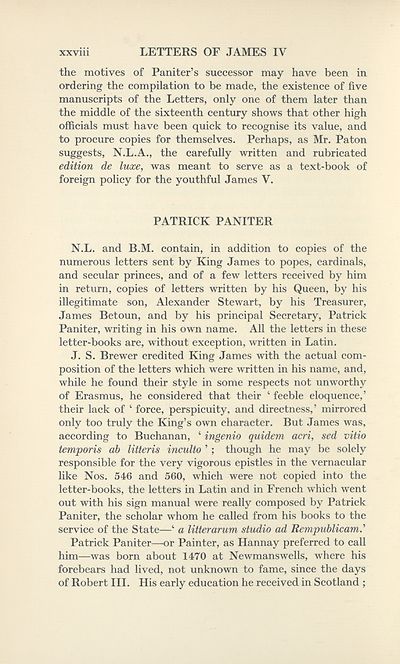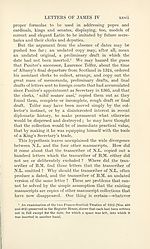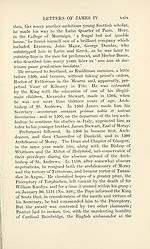Series 3 > Letters of James the Fourth, 1505-1513
(35) Page xxviii
Download files
Complete book:
Individual page:
Thumbnail gallery: Grid view | List view

xxviii LETTERS OF JAMES IV
the motives of Paniter’s successor may have been in
ordering the compilation to be made, the existence of five
manuscripts of the Letters, only one of them later than
the middle of the sixteenth century shows that other high
officials must have been quick to recognise its value, and
to procure copies for themselves. Perhaps, as Mr. Paton
suggests, N.L.A., the carefully written and rubricated
edition de luxe, was meant to serve as a text-book of
foreign policy for the youthful James V.
PATRICK PANITER
N.L. and B.M. contain, in addition to copies of the
numerous letters sent by King James to popes, cardinals,
and secular princes, and of a few letters received by him
in return, copies of letters written by his Queen, by his
illegitimate son, Alexander Stewart, by his Treasurer,
James Betoun, and by his principal Secretary, Patrick
Paniter, writing in his own name. All the letters in these
letter-books are, without exception, written in Latin.
J. S. Brewer credited King James with the actual com¬
position of the letters which were written in his name, and,
while he found their style in some respects not unworthy
of Erasmus, he considered that their ‘ feeble eloquence,’
their lack of ‘ force, perspicuity, and directness,’ mirrored
only too truly the King’s own character. But James was,
according to Buchanan, ‘ ingenio quidem acri, sed vitio
temporis ab litteris inculto ’ ; though he may be solely
responsible for the very vigorous epistles in the vernacular
like Nos. 546 and 560, which were not copied into the
letter-books, the letters in Latin and in French which went
out with his sign manual were really composed by Patrick
Paniter, the scholar whom he called from his books to the
service of the State—‘ a litter arum studio ad Rempublicam.,
Patrick Paniter—or Painter, as Hannay preferred to call
him—was born about 1470 at Newmanswells, where his
forebears had lived, not unknown to fame, since the days
of Robert III. His early education he received in Scotland ;
the motives of Paniter’s successor may have been in
ordering the compilation to be made, the existence of five
manuscripts of the Letters, only one of them later than
the middle of the sixteenth century shows that other high
officials must have been quick to recognise its value, and
to procure copies for themselves. Perhaps, as Mr. Paton
suggests, N.L.A., the carefully written and rubricated
edition de luxe, was meant to serve as a text-book of
foreign policy for the youthful James V.
PATRICK PANITER
N.L. and B.M. contain, in addition to copies of the
numerous letters sent by King James to popes, cardinals,
and secular princes, and of a few letters received by him
in return, copies of letters written by his Queen, by his
illegitimate son, Alexander Stewart, by his Treasurer,
James Betoun, and by his principal Secretary, Patrick
Paniter, writing in his own name. All the letters in these
letter-books are, without exception, written in Latin.
J. S. Brewer credited King James with the actual com¬
position of the letters which were written in his name, and,
while he found their style in some respects not unworthy
of Erasmus, he considered that their ‘ feeble eloquence,’
their lack of ‘ force, perspicuity, and directness,’ mirrored
only too truly the King’s own character. But James was,
according to Buchanan, ‘ ingenio quidem acri, sed vitio
temporis ab litteris inculto ’ ; though he may be solely
responsible for the very vigorous epistles in the vernacular
like Nos. 546 and 560, which were not copied into the
letter-books, the letters in Latin and in French which went
out with his sign manual were really composed by Patrick
Paniter, the scholar whom he called from his books to the
service of the State—‘ a litter arum studio ad Rempublicam.,
Patrick Paniter—or Painter, as Hannay preferred to call
him—was born about 1470 at Newmanswells, where his
forebears had lived, not unknown to fame, since the days
of Robert III. His early education he received in Scotland ;
Set display mode to:
![]() Universal Viewer |
Universal Viewer | ![]() Mirador |
Large image | Transcription
Mirador |
Large image | Transcription
Images and transcriptions on this page, including medium image downloads, may be used under the Creative Commons Attribution 4.0 International Licence unless otherwise stated. ![]()
| Scottish History Society volumes > Series 3 > Letters of James the Fourth, 1505-1513 > (35) Page xxviii |
|---|
| Permanent URL | https://digital.nls.uk/126697011 |
|---|
| Attribution and copyright: |
|
|---|
| Description | Over 180 volumes, published by the Scottish History Society, containing original sources on Scotland's history and people. With a wide range of subjects, the books collectively cover all periods from the 12th to 20th centuries, and reflect changing trends in Scottish history. Sources are accompanied by scholarly interpretation, references and bibliographies. Volumes are usually published annually, and more digitised volumes will be added as they become available. |
|---|


